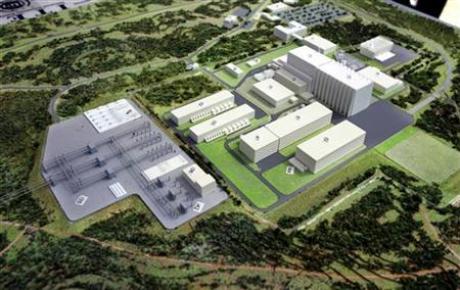Costly Nuclear Fusion Demo Worries Cash-Strapped EU
Country: BELGIUM
Author: Pete Harrison

Photo: REUTERS
A funding battle is brewing in Europe over a 16-billion-euro ($21.5 billion) experiment to crack the puzzle of commercializing nuclear fusion -- the process that powers the sun.
The European Union's executive arm is trying to coordinate an extra contribution of 1.4 billion euros in 2012-2013 from EU member countries, whose finances have been crippled by the economic crisis.
Many environmentalists say the cost of the International Thermonuclear Experimental Reactor (ITER) project is out of control and money would be better spent on low-carbon projects such as home insulation which also create millions of jobs.
ITER's backers argue it has the potential to change the course of history and needs unwavering commitment.
At the center of the issue are dreams of harnessing nuclear fusion, which releases vast amounts of energy in the core of a star, under huge gravitational forces and temperatures of around 10 million degrees Celsius.
Scientists have shown the process can be recreated on Earth, combining simple hydrogen isotopes to release vast amounts of energy, but so far it has not been demonstrated on an industrial scale. Nor have previous experiments released more energy than they consume.
In 2006, more than 30 countries signed a deal to build the ITER nuclear fusion reactor, under construction in Cadarache, southern France.
At its core will be a 500-cubic-meter doughnut-shaped steel vessel in which a superheated stream of plasma circulates in a vacuum, held in place by superconducting magnets.
EXPLODING COSTS
If all goes well, from 2020 the project will be capable of generating around 500 megawatts of fusion energy -- clean power with no climate-damaging emissions and little radioactive waste.
But increasing complexity and rising prices for steel, concrete and copper have led to a tripling of construction costs since they were estimated in 2001. The 27-country European Union is committed to picking up 45 percent of that.
"It is irresponsible to invest huge amounts in a dead-end technology without creating jobs in this period of financial crisis," said Green group politician Claude Turmes.
A 1.4 billion euro funding gap has emerged in the EU contribution over the two years 2012-2013, and the European Commission also hopes to coordinate a stable source of longer-term funding within the next EU budget from 2014.
The overall EU share of construction costs has more than doubled from 2.7 billion euros in 2001 to 7.2 billion now.
The timing could not have been worse.
Spain, Italy and Greece are grappling with huge public debts and unions have been demonstrating against austerity measures.
"Instead of a huge investment with exploding costs and without any added value, we Greens think we should use techniques that are available and reliable now like renewables and energy efficiency," Turmes said.
But European Commission officials argue the two issues are not connected and that EU governments have always remained well-informed on the cost overruns as they have the bulk of members on ITER's European executive board.
"We must not lose sight of the potentially epoch-changing benefits of ITER," EU Research Commissioner Maire Geoghegan-Quinn told ministers recently.
"The potential prize in terms of energy supply and security, tackling climate change and also in terms of major contributions to our economies and to geopolitical stability is huge," she said.
Constructing ITER will also lead to spin-off benefits in research, such as new heat-transfer technology and superconducting magnets that could be used in levitation trains and the transport of electricity, officials say.
ITER's international council, which also includes Japan, India, China, Russia, South Korea and the United States, will meet on June 16 to discuss the scope, schedule and costs of the project. But the meeting is unlikely to reach concrete decisions until the EU has solved its financing issues.
(Editing by Janet Lawrence)